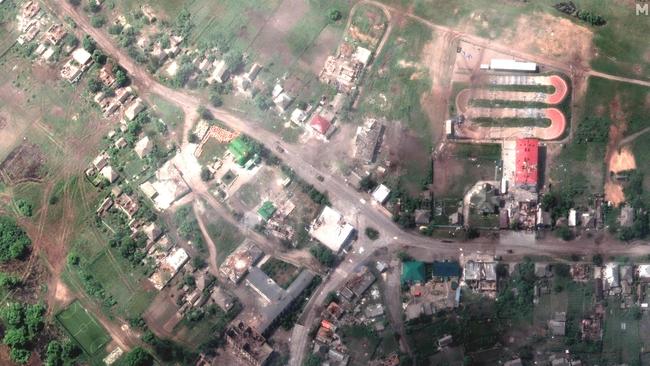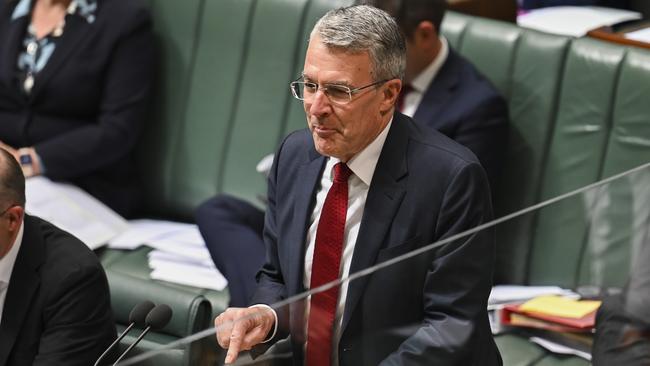Australia expands sanctions on Putin regime
Australia has backed Ukraine’s claims of genocide against Russia in the International Court of Justice and expanded sanctions on senior members of Vladimir Putin’s regime.

Australia has backed Ukraine’s claims of genocide against Russia in the International Court of Justice and expanded sanctions on senior members of Vladimir Putin’s regime.
As Ukraine forces recaptured the key town of Lyman, Australia filed an intervention to the UN court backing Ukraine’s claims Russia had violated the genocide convention.
The government also imposed financial sanctions and travel bans on an extra 28 Russian ministers and senior officials involved with holding “sham” referendums in four Ukrainian provinces, bringing the total number of people sanctioned by the Albanese government to 871.
Attorney-General Mark Dreyfus said the government stood with Ukraine in “bringing these proceedings against Russia before the International Court of Justice”. “Our intervention underscores our commitment to upholding fundamental rules of international law and the integrity of the Genocide Convention,” Mr Dreyfus said.

On Friday, Mr Putin said he had signed treaties to annex four regions of Ukraine after claiming referendums showed it was the will of the people in those territories. Foreign Affairs Minister Penny Wong condemned Russia for claiming it had local support for annexing the Ukrainian regions of Luhansk, Donetsk, Kherson and Zaporizhzhia.
“These additional sanctions reinforce Australia’s strong objection to the actions of President Putin and those carrying out his orders,” Senator Wong said.
“The areas of Ukraine currently occupied by Russian forces are the sovereign territory of Ukraine. No sham referendum will change this.”
In its submission to the International Court of Justice, the Albanese government “stresses its continued commitment to the rule-based international order that is critical for maintaining international peace and security”.
Australia used its submission to recognise the “vital” role the UN court plays “in relation to the peaceful settlement of disputes”.
On Sunday, Ukraine forces entered Lyman, in one of the four Ukrainian regions that Russia annexed despite international condemnation. Ukraine’s defence ministry announced its forces were “entering” Lyman after Kyiv’s army said it had “encircled” several thousand Russian troops.
Shortly after Ukraine’s announcement, Russia’s defence ministry said it had “withdrawn” troops from Lyman “to more favourable lines”.
After a meeting in Hawaii with Deputy Prime Minister Richard Marles, US Secretary of Defence Lloyd Austin said Ukraine recapturing Lyman was “absolutely” significant. “We’re very encouraged by what we’re seeing right now,” Secretary Austin said.
“Lyman sits astride the supply lines of the Russians, and they’ve used those routes to push men and material down to the south and to the west, and without those routes, it’ll be more difficult.”
Mr Austin, who has left open the option of allowing more countries to join AUKUS, said the US was working with Australia and Japan to balance the influence of autocratic nations in the Indo-Pacific region. “We’re deeply concerned by China’s aggressive, escalatory and destabilising military activities in the Taiwan Strait and elsewhere in the region,” he said.
“We talked about enhancing our interoperability, and expanding our operations, and advancing our ongoing force posture initiatives, and deepening our defence industrial co-operation.”
Mr Marles said the government would look at ways to help facilitate more US troops in the region, opening the door to more rotations in Australia.
“Right now we have the Marine rotation in Darwin … but we want to look at other ways in which we can build upon American force posture and doing that in co-operation with Australia,” he said.
Mr Marles said that the government was on track to announce a nuclear submarine partner early next year.
“It will not just be what submarine we’re going with, but how quickly we can get it, and to the extent that there is any capability gap that arises how that capability gap can be resolved,” Mr Marles said.








To join the conversation, please log in. Don't have an account? Register
Join the conversation, you are commenting as Logout